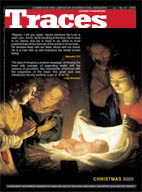
Traces N.10, November 2005
The Urgency of ReasonIn recent times, the discussion concerning the faith and its “public” value, that is, faith’s relationship with the capacity to reason and the impact it can have on the life of society and its problems, has become more vigorous. It is a debate that has always concerned us. Communion and Liberation has all too often been the occasion for curiosity and for polemics regarding this matter. On the one hand, it is looked upon with sympathy, and on the other, with diffidence, since it affirmed and affirms–in a secularized world–that God is alive, is present, and has to do with everything. It is looked upon with sympathy on the part of Catholics and of liberal spirits who don’t resign themselves to considering God and Christianity an old contraption whose only use is for funerals and preaching, and looked upon with diffidence by those, heirs of a tradition that proclaims itself enlightened, who thought they had managed to consign the problem of God to a museum, or to the field of individual pathologies.
It is not a new debate, but some new facts have re-launched it. Let’s take a look at these. First of all, there is something new in the fact that in lay circles, on the part of some outstanding personalities, a kind of dissent has broken out regarding laicist and violently antireligious positions manifested on the occasion of great disputes over delicate questions. For example, in the ethical debate dealing with procreation, some unbelieving lay people acknowledge the Christian position as having greater respect for reason and a greater awareness of the contemporary cultural situation.
In the second place, the arrival on the scene of phenomena linked to a presumed religious matrix (fundamentalist Islamic terrorism, as well as massive immigration) poses serious questions about their (the nonbelievers’) claimed identity, questions that cannot be deferred. These phenomena stress further the differences between Christianity and other answers to the religious question. These in turn are added to other phenomena, no less important, that signal the weakening of the social fabric in which we are living, and a loss of the reasons for peaceful co-existence and for striving for an ideal of the common good.
The third and most crucial new factor is the strong appeal of human fascination offered by the persons and the magisterium of John Paul II and Benedict XVI, acknowledged amongst the few adequate dialogical partners for those who feel responsibility before the great problems of our time.
We know quite well that Christianity is known and is communicated through life, and not through debates. We don’t therefore expect “growth” to come from these types of discussions. At times, it is rather boredom and discomfort that prevail when you look at the presumptuous pettiness of some complaints, as in response to the Pope expressing judgments on society. It’s evident, particularly in some ambits, that Christianity exerts a powerful attraction for men who do not hide themselves behind prejudices or calculations. And the question is, why? Benedict XVI pointed to the answer on two recent occasions, a Wednesday catechesis and a message to the organizers of a convention at Norcia.
Commenting on Psalm 134, the Pope re-launched God’s appeal to Israel who had chosen idolatry. The true alternative is not between faith in God and no faith. Faith is a gift, a grace. The true alternative is between those who, perhaps dramatically, accept the hypothesis that God exists and those who exclude it, ending up slaves to idols, “the work of man’s hands, a product of human desires.” It is an evident fact in the society we live in. We are surrounded by idols that do not correspond to man’s heart and leave him in baffled despair, indifferent to everything and everyone. Some nonbelievers have touched with their hands the blindness and falsity of many idols. And the idol raised most aloft by the men of the century recently ended is the dominant mentality, made up of judgments fostered by those in power. So, when the Pope indicates that there is something that comes before the latest modern stance on an issue, that there is a Father who is greater and is less of a boss, who has inscribed something inviolable in the nature of his children, these new preachers call “Foul! You have invaded our field!” and raise up barricades to defend the enclosure of their certainties that no one may judge. Free men, instead, who have a faith, or perhaps do not–who in any case have not closed the door on the possibility that something new can happen–notice something rationally true, and urgent.